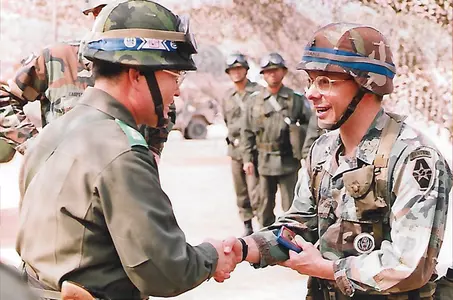The University of Texas at Austin Athletics

Texas Lottery Veteran Recognition: Joe Cerami
09.16.2022 | Longhorn Sports Properties / Learfield
The retired Army Colonel will be honored when Texas Football hosts UTSA on Sept. 17.
Military ethos has been a constant in Joe Cerami's life. As a boy, Cerami observed and respected adults who served in World War II, and he participated in Boy Scouts. When the call came to attend college at West Point, Cerami said he felt like he had "won the lottery."
At the United States Military Academy, the ideals of "duty, honor, and country" were ingrained and also practiced. There Cerami started to learn military leadership, including through Army athletics, which involved teamwork on the "fields of friendly strife."
Cerami advanced to the rank of Colonel during a 30-year Army career that began with field artillery assignments in the 82nd Airborne and 3rd Armored Divisions. He later served as an operations, plans and exercises, and combat development staff officer, and finally as an Army strategist, in what Cerami calls "a typical career path for officers during the Cold War."
What distinguishes Cerami is how he converted ordinary opportunities into significant learning and teaching assignments, which culminated in values-based education and training for soldiers and civilian students alike.

Cerami attended the Command and General Staff College, the School of Advanced Military Studies and the Army War College; he holds a doctorate from the Penn State School of Public Affairs, a master's in government from the University of Texas, and a bachelor's in engineering from West Point.
He taught political science and international affairs at West Point, and the colonel's last military assignment was as the Director of International Security Studies and then Chair of the Department of National Security and Strategy at the Army War College in Carlisle Barracks, Pennsylvania.
Cerami was teaching at Carlisle while simultaneously pursuing his doctorate at Penn State. He focused on the subfields of leadership and public management, which exposed Cerami to leadership concepts like positive psychology and other soft skills that expanded on his experience with the typical rank-and-file management mentality of the Army. What he read in the academic literature translated back into his classroom, where he integrated new knowledge into topics around bureaucratic politics, public policy, political institutions, security studies and strategy.
In fact, one of his fellow War College department faculty professors would joke aloud: "What new experiment are you trying on us now?"
"The leadership literature works," Cerami said. "I took ideas and techniques from the top university programs. It paid dividends in my final years in the Army and then while teaching leadership at two universities."
Even during his undergraduate engineering program at West Point, Cerami took electives in national security and public affairs. He said that he always enjoyed studying how strategic decisions were made by presidents and senior military officers. His Army career was directed down the military planning and strategy tracks, but significant, if not also unexpected, moments along the way pointed more specifically to Cerami's call to lead and teach.
As an early-career officer stationed in Germany, Cerami said he was thinking of getting out of the Army, but a respected sergeant encouraged him to stay because he said Cerami was "really good at taking care of your soldiers." Another mentor, many years later, urged Cerami to get his Ph.D. and then teach at the university level after Army retirement.

Cerami went on to serve as the founding director of the Public Service Leadership Program at the Bush School of Government and Public Service at Texas A&M from 2001-2015, and most recently Cerami served on the faculty at University of St. Thomas-Houston as the Burnett Family Distinguished Chair in Leadership, Director of the Center for Ethical Leadership and associate professor of management.
Cerami said one of his most significant and fun leadership positions was with the Bryan Rotary Club. He served as President in the Club's Centennial year and during the height of the pandemic. The real-world experience of working with a diverse group of people, in a values-based organization, helped him translate principles and service mindsets into what he was also establishing and teaching at A&M and then at St. Thomas. Cerami is currently a member of the Georgetown Rotary Club and is continually inspired by the selfless service of Rotarians in Georgetown and worldwide.
"I enjoy working with people who are committed to doing good work for others," said Cerami, who has also been involved with non-profits like Habitat for Humanity, Junior Achievement, and the Boys and Girls Club. "I am amazed by all the good people who volunteer to serve their communities."
Cerami's life is dedicated to service and creating environments where people can engage and do so willingly.
"My life has gone far beyond my expectations," Cerami said. "I have been fortunate to have so many wonderful opportunities and people who have stepped in at different moments – mentors at all levels – who have generously guided me for many years."
Thanks to the Texas Lottery, great things are happening all across Texas. The Texas Lottery now consistently contributes more than $1.6 billion of lottery revenue each year to good causes like public education and veterans' assistance programs. Beginning with the first veterans' dedicated scratch ticket game in 2009, the Texas Lottery has now contributed over $189 million to the Fund for Veterans' Assistance.
Since 1992, the Texas Lottery has generated more than $35 billion in revenue for the state of Texas. Through strict adherence to their vision, mission and core values, the Texas Lottery is dedicated to ensuring that this support continues.

